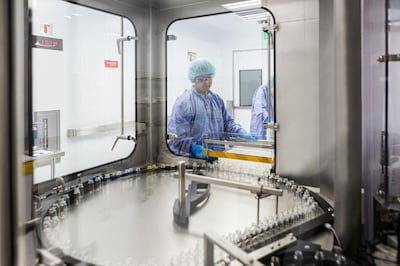Hopes of an effective treatment for Covid-19 have soared following the announcement of positive results from the first major trial of the anti-viral drug remdesivir.
Preliminary findings from the international study, set up by the US Institutes of Health and involving more than 1,000 severely ill patients, suggest the drug can speed recovery. It may also cut the risk of death.
US authorities approved remdesivir on Friday, with President Donald Trump describing developments as a "very promising situation,”. He was joined at the White House by Daniel O’Day, chief executive of Gilead Sciences, which makes the drug.
However, researchers caution it is still too early to hail it as a “magic bullet” that will end the pandemic.
What is remdesivir?
Originally developed by California-based Gilead Sciences to treat Ebola, remdesivir is one of several drugs that have been “repurposed” in the hope they may combat the new coronavirus responsible for Covid-19.
In the case of remdesivir, lab tests showed activity against the viruses responsible for Sars and Mers, which are similar to Covid-19.
How does it work?
The drug is thought to work by interfering with the virus’s ability to make copies of itself.
After invading a healthy cell, SARS-CoV-2 mass-produces copies of its own genetic instructions.
These slip into the cell’s biochemical factory, which starts churning out vast numbers of the virus. They then burst out of the cell, killing it before moving on to invade more cells.
Studies by researchers at the University of Alberta suggest remdesivir inhibits polymerases, the “photocopier” enzymes used by the virus to make copies of its genetic instructions. Without those, the virus struggles to replicate inside healthy cells.
How effective is remdesivir?
The first results from the latest trial – known as the Adaptive Covid-19 Treatment Trial – found that those patients given the drug typically recovered in 11 days, compared to 15 days for those given a placebo.
The results also suggest that the drug may cut the risk of dying from Covid-19. Eight per cent of those given the drug died, compared to 11.6 per cent of those on placebo.
However, the researchers found that this difference was not statistically significant, meaning there is still considerable uncertainty about the true impact on survival.
But hasn’t remdesivir already failed in another study?
A draft report of a much smaller study, accidentally published by the World Health Organisation last week, was widely reported to have shown remdesivir had failed.
Based on results from 237 patients in Wuhan, China, the results pointed to a slightly higher death rate among patients given the drug than those on the placebo.

There were also reports that the trial was stopped early because of concern over side-effects.
However, Gilead Sciences said the trial had been terminated because it could no longer find enough sick patients in Wuhan to take part. As a result, the trial was too small to reach conclusive findings, and the apparent increase in deaths was not statistically significant.
What happens next?
The drug looks set to be put on a fast track for approval. The US Food and Drug Administration is in discussions with Gilead Sciences “regarding making remdesivir available to patients as quickly as possible, as appropriate”.
The company has also stated that it will make its current supply – 1.5 million doses – available free of charge.
So is remdesivir the answer to the global pandemic?
The new findings have been seized on because they are the first evidence that a drug might help fight Covid-19.
However, they also suggest remdesivir is no miracle cure: the improvement in survival rate found so far is modest – albeit with seriously ill patients. More studies are needed to reveal if it works better if given earlier, and whether there are serious side-effects.

Ultimately a combination of drugs may be needed to defeat Covid-19. Like bacteria, viruses mutate, which can make them resistant to any individual drug.
The search for other potential treatments is continuing, with more than 30 identified that have either been approved or are in clinical trials for other diseases.
Around a dozen – including the anti-malarial drug chloroquine promoted by US President Trump – are already in clinical trials for Covid-19.
Robert Matthews is visiting professor of science at Aston University, Birmingham, UK









